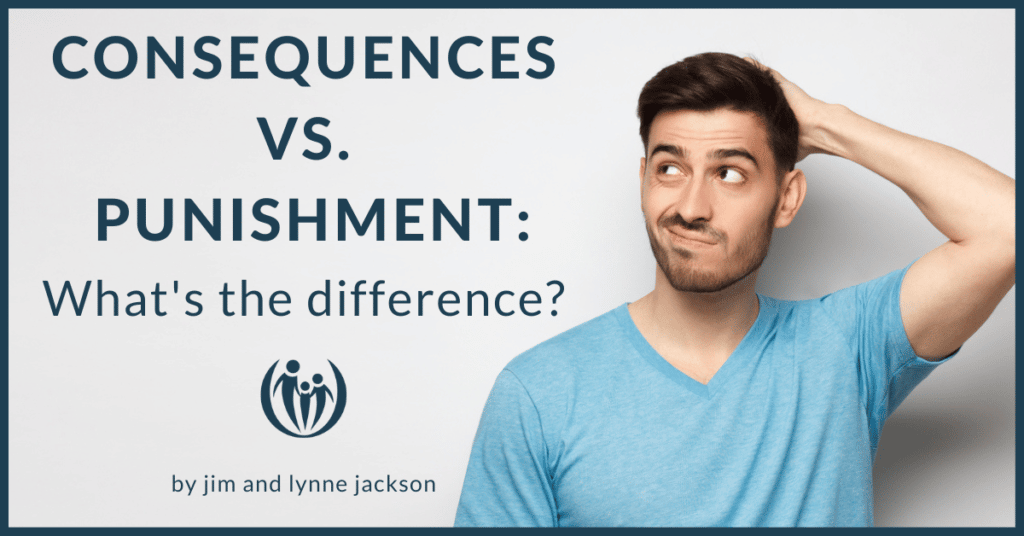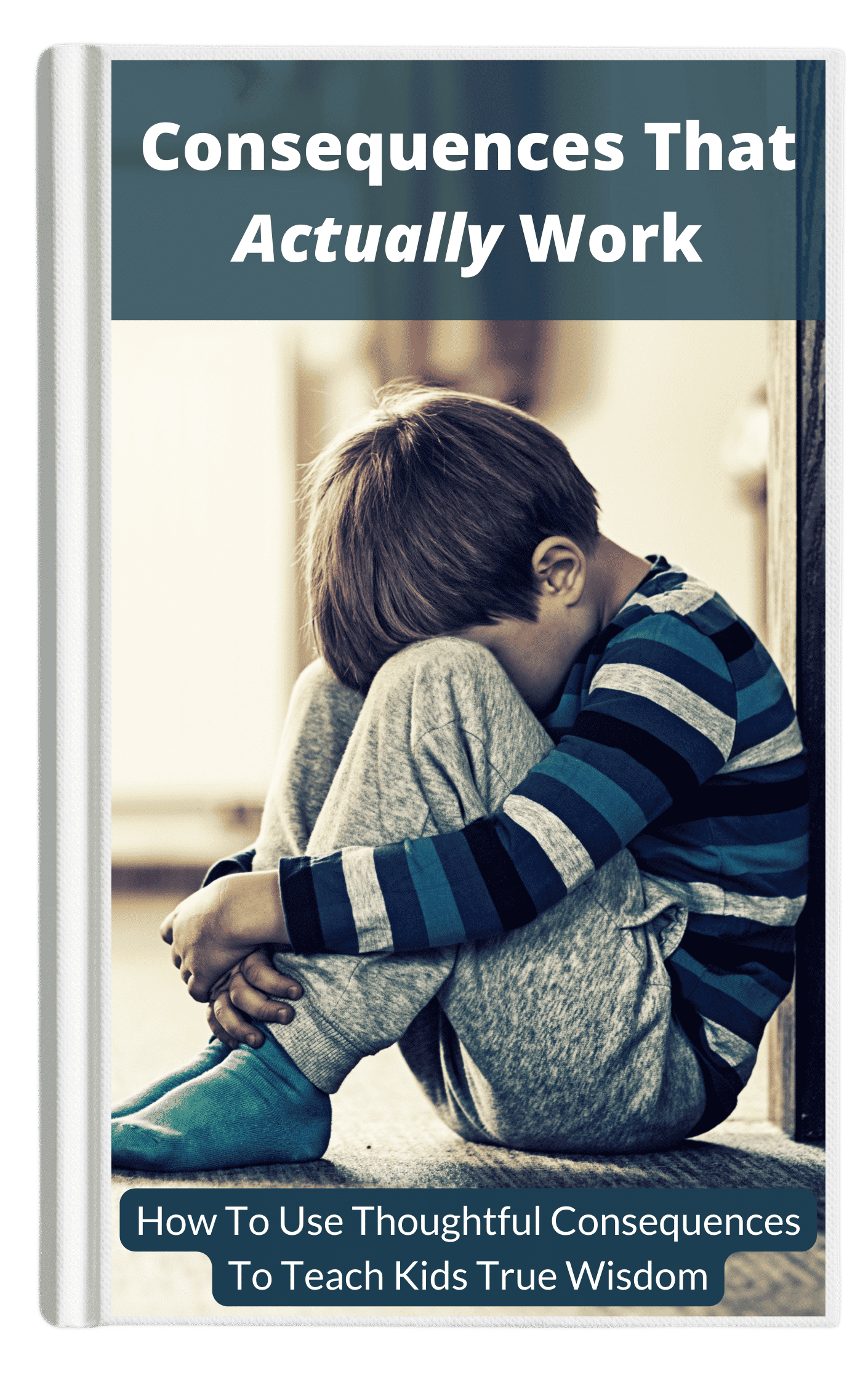
Consequences vs Punishment: What’s the Difference?

If you’ve been parenting any time at all, you likely have made a significant discovery: Despite your most graceful efforts to stay calm, connect well, and guide them with grace, your kids still misbehave.
So what do you do in those moments?
Most parents, even thoughtful parents, try to put in place some consequences for misbehavior. But without a clear understanding of the difference between consequences and punishment, those efforts can easily be counter-productive. So if you’ve been frustrated by your attempts to discipline your child’s misbehavior effectively, it’s time to understand both terms clearly.
Table of Contents
The difference between consequences and punishment
So, is there really a difference between a “consequence” and a “punishment”? It might sound like semantics, but we see a significant difference, and it has a lot to do with the goal involved.
Consequences
Merriam-Webster defines a consequence as “something produced by a cause or necessarily following from a set of conditions.”
In simpler words, a consequence is “the result of an action or event.” The key is that these are results that follow an event automatically. You punch a brick wall, and your hand hurts (or worse). You drive too fast around a wet curve; the car spins out. The consequences of overeating might include an upset stomach, heartburn, and over time other health challenges such as heart disease. The consequences of hitting your brother are hurt feelings and bruises, the loss of closeness, and the desire to stay away. Understanding and helping kids understand the automatic results of their actions is a key to growing in God’s wisdom.
At Connected Families, we refer to “natural impacts” and “imposed consequences” so that the common misunderstandings about “natural consequences” and “logical consequences” don’t confuse the teaching.
Punishment
Merriam-Webster defines punishment as:
- “a: suffering, pain, or loss that serves as retribution”
- “b: a penalty inflicted on an offender through judicial procedure.”
The key words here are “retribution” and “inflicted on an offender.” There is a goal to inflict some type of “pain” so that justice is served. Our penal system (for better or worse) is generally designed to look like this. You do something wrong, you get caught, and you will be made to suffer for it. The hope is that the inflicted pain will motivate better behavior.
For example: Fear of the punishment of increased fines or even loss of driving privileges compels most people to drive according to the law. When the fear of being caught diminishes, lawless driving increases unless drivers are motivated by an understanding of natural consequences.
More about all that in a minute. Let’s look more closely at the differences between consequences and punishment as it relates to parenting.

The difference between punishment and consequences in parenting
In the short term, punishment as a parenting strategy can work if by working we mean immediate behavior change. This is why parents often make a particular punishment their “go-to” discipline method. Spanking, time-out, and immediate loss of a favorite privilege or object- all tend to curb unwanted behavior. So they become the default approach. Quick, easy, and efficient. As long as kids fear punishment enough, the threat of it sometimes “works” to shape behavior.
But over time, when parents use punishment as their go-to disciplinary measure (inflicting a painful experience to achieve justice or to modify behavior), it almost always builds resentment and resistance in a child. Why? Because punishment is more about controlling others than it is about nurturing and empowering them.
Consider this: When was the last time you were eager to honor or cooperate with someone you knew was trying to control your behavior with punitive approaches?
You know a child is growing in resentment if either A) they tend to misbehave when their punishers aren’t around, or B) their misbehavior and reactions to punishment become more volatile. Somewhere around the pre-teen or early teen years, kids who have lived in fear-based compliance tend to either “go underground” with their misbehavior or simply lash out more when punished.
This resentment and lashing out is why we often get emails from parents requesting help who say something like, “Everything was fine until our child turned 10 or 11. Then everything changed all of a sudden! It feels like a different kid!” The truth is that nothing changed all of a sudden. Instead, at about age 10, children discover that they have the power to fight back. Combine their pent-up resentment with the early chemistry of adolescence, mix in the sinful nature of both parent and child, and it can get messy and volatile fast and often!
We don’t want to minimize the fact that the pre-teen and early teen brain can be a confusing mix of irrational thoughts and emotions. And we don’t want to discount the power of sin in all of us that compels us to “not do what I want to do, and hate what I do” (Romans 7:15).
But when parents learn early to use insightful, respectful consequences – only when necessary and with Godly wisdom, we find their reports about pre-teen and teen behavior to be much less emotionally charged and more filled with God’s grace.
To avoid confusion about a common misunderstanding of the term “natural consequences” we have coined the term natural impacts to make it easier to identify and teach our kids the automatic cause-effect impact of any behavior. This impact happens without intervention.
Why “natural impacts” are an effective disciplinary approach
While punishment may sometimes “work” to temporarily modify behavior, the natural impacts of your child’s behavior will be their best life-long teacher if you teach them to pay attention.
Kids are “beloved sinners” of course (just like us) and need corrective guidance (just like we do). But instead of a goal of pain that modifies behavior or metes out justice, you can shift to a goal of communicating to your child the powerful message, “You are responsible for your life, your relationships, and your decisions.”
Galatians 6:7 says, “Do not be deceived: God cannot be mocked. A man reaps what he sows.” This verse is a planting metaphor. If you plant apple seeds, you can’t grow cucumbers, only apples. If you plant bad seeds, bad stuff naturally grows. But if you plant good things, you will reap a good harvest. Natural impacts are the built-in “harvest” that comes based on the actions we choose.
Parents often tell us they give their kids “natural consequences,” like doing extra chores or giving timeouts so kids can settle down. And kids begin to think of “natural consequences” as: “When I misbehave, I naturally get in trouble with Mom or Dad.” But these are not natural consequences. Instead, they are a sort of punishment implemented by parents.
To avoid confusion about a common misunderstanding of the term “natural consequences” we have coined the term natural impacts to make it easier to identify and teach our kids the automatic cause-effect impact of any behavior. This impact happens without intervention.
For example, when one child hits another, he feels “icky” inside, and the other child gets hurt and feels upset. When a child lies, her friends may not trust her anymore.
You can build wisdom as you help kids notice the natural impact. But, if instead you swiftly impose consequences, you draw attention away from what has naturally happened as a result of your child’s actions. Immediate imposed consequences can block the learning opportunity.
For example, most of the time, when a child (or grown-up) sins, we feel bad – guilty. And we should because we have sinned. It’s the feeling God intends to help compel us to reconcile that sin.
But if someone immediately and forcefully puts a consequence in place, we will focus on the punishment or the one who doled it out. The God-given natural impact (feeling bad about what we did) is erased by resentment about the punishment. Instead of doing the work to reconcile our guilty feeling (confessing and repenting), the punishment might motivate us to not misbehave like that again. (Or to just not get caught!)

To help kids learn from natural impacts, step out of the way!
To help children learn, sometimes you have to get out of the way and let the mess unfold without imposing extra punishment.
Then, when things simmer down, talk gently with your child. Use lots of relaxed questions to help them understand the cause-and-effect relationship between their behavior and its impacts on everyone involved. (We’ll talk soon about how to impose effective consequences that help kids learn and grow from their actions.)
When our son Noah went through a phase of struggling with lying, we initially dealt with it by firm confrontation or imposed consequences, which felt like punishment to him. We got nowhere. It was almost like “Game On” to see if he could sneak one by us. Then we changed our approach and did three things that encouraged him toward honesty.
- When he told the truth, even for little things, we focused on the value of his honesty for protecting our trust and connection (the natural impact of honesty).
- We taught him to pay attention to that little feeling in his stomach that would come with a lie (one of the natural impacts of dishonesty). It was God’s gift to him so he could confess his sin and protect the trust and connection between us.
- We helped him understand more natural impacts of lying: the mistrust, the broken relationships, the hardened heart that comes from ignoring that icky feeling in your stomach.
Soon he was coming back to us to confess if he had lied. It was not that long until he was pretty much done lying. Largely because of this experience, Noah has been firmly committed to honesty through his teen years and as a young adult.
Sometimes kids are not responsive to the natural impacts of their behavior. The impact might be too abstract (i.e., what does trust in a relationship mean to a 5-year-old?) or so delayed that it doesn’t have value (i.e., cavities from too much candy). So how can you use helpful, respectful, imposed consequences in a way that doesn’t pit you against your child but guides them toward making wiser choices in the future?
Brothers and sisters, if someone is caught in a sin, you who live by the Spirit should restore that person gently. But watch yourselves, or you also may be tempted.
Galatians 6:1
Imposing consequences: When your kids need a little more help
When your child is not interested or willing to learn from the natural impacts of their behavior, you can impose a constructive, helpful consequence to guide your child to restore or make right the natural impact of their actions. The ultimate discipline goal should be heart change, not instant “justice” or feeling back in control.
Here are some examples of unique, “imposed consequences” in scripture with a corresponding parenting example.
1. Loss of privilege
When Adam and Eve disobeyed, they lost the privilege of living in the garden. God’s love and care for them continued, starting with covering their shame with clothing.
When children misuse a privilege, it is fitting to remove that privilege so they learn to value it. (This is not the same as taking away their favorite item whenever they misbehave.) Whether it’s a Matchbox car or the family car, it is reasonable to take away the car if it’s not used according to clearly stated expectations. When restitution is made, or a child shows they are ready for the responsibility related to that privilege, the privilege can be reinstated.
2. “Do Overs” / Practicing a right response
In the Bible, when Jonah refused to go to Ninevah, he got a little transportation help and a second chance to do what he was called to do—a “do-over,” if you will. It was a solution, not a punishment, that helped Jonah get back on the intended track.
A whiny child may be asked to practice asking respectfully two or three times before requests are considered, to help them remember to ask respectfully in the future.
3. Restitution consequences and reconciliation
Matthew 18 commands direct reconciliation between an offended person and the offender, with gradually increasing assistance if needed.
Practically speaking, when kids offend or hurt others, they can be held accountable to reconcile when they’re ready to truly apologize. If a consequence is needed, they can make restitution, like doing something kind for a sibling after physical aggression. Reconciliation is an essential and oft-overlooked alternative to punitive discipline, but it takes grace and wisdom to guide kids.

Logical consequences: restoring a child gently
These three examples are about getting back on track when we’ve gone astray, and they reflect the grace for sinners found in Galatians 6:1, “…if someone is caught in a sin, you who live by the Spirit should restore that person gently.”
Restore. Not punish. The word’s meaning is rooted in “mending a broken bone.” Bring back into right alignment.
Not only is restoration the goal, but it’s also clear that we are to lean into the fruit of the Spirit (Galatians 5:22, 23) to do the restoring!
What a difference between a loving consequence and a punishment!
And if we want a loving relationship with our child that helps them understand the love of God, this is vital. Scripture tells us that punishment causes fear and hinders love. “There is no fear in love. But perfect love drives out fear because fear has to do with punishment. The one who fears is not made perfect in love.” I John 4:18
One dad stated, “I’m so grateful for the Connected Families Framework that helps me discipline my child the way God disciplines me.”
There is no fear in love. But perfect love drives out fear because fear has to do with punishment. The one who fears is not made perfect in love.
I John 4:18
A couple of insightful stories
To make this all come to life, we’ll close with some encouraging stories from parents like you!
Grant was nonchalant about striking a boy in the back with a billiard ball, so his mom had him call an acquaintance in the medical profession to find out what injury might have happened if it had struck him on his spine or head. When he understood what harm he might have caused, Grant wanted to write a letter of apology for his carelessness. They also found out the cost of X-rays that his friend received, and he helped pay those charges.
David was bullying his sister and randomly hitting her or shoving her out of his way. His mom discussed the natural impact: He was practicing aggressive behavior, and Katie was learning victim-like submission to it. The imposed “make-it-right” consequence to offset these patterns was for him to follow her directions while playing “Katie Says” (like Simon Says). When David understood this would help his sister not get bullied at school, he participated willingly. When her instructions were timid, both her mom and brother said, “No, Katie, say it strong!” The result? She was more confident, and he was less aggressive toward her.
As you shift your goal to guiding kids toward restoration, it becomes easier to communicate identity-strengthening messages from the Connected Families Framework as you discipline. These messages are:
- “You are SAFE with me”
- “You are LOVED no matter what”
- “You are CALLED and CAPABLE”
- “You are RESPONSIBLE for your actions”
When you are better able to communicate these messages, even as your kids misbehave, they will likely be well on their way to valuing God’s grace and truth in their lives!
If this shift is a challenge for you, keep coming back to these ideas. Register for our Discipline That Connects With Your Child’s Heart online course, to help you cement new habits for graceful parenting. Above all, keep praying and looking to God for eyes of discernment about what is reaching your child’s heart.
Because your kids aren’t perfect. Neither are you. That’s why you need a plan for discipling your kids in the hard moments.





